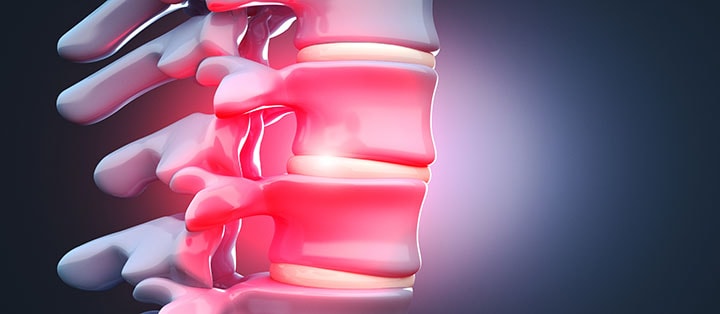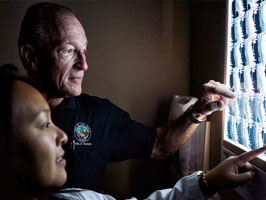If you suspect you may be suffering from a spinal condition, you are not alone. Many Americans encounter spinal conditions that cause pain, discomfort and inflammation every day. Oftentimes, this pain can be linked to a herniated nucleus pulposus, commonly referred to as a herniated or slipped disc. In fact, many Americans will experience a herniated nucleus pulposus at some point in their lives. This condition occurs when the soft, liquid-like nucleus of an intervertebral disc begins to leak out from within the disc’s hard outer casing. This often occurs as a result of the natural aging process, during which intervertebral discs regularly lose water content and become susceptible to dehydration and degeneration.
It is possible to have a herniated nucleus pulposus without being aware of it. Usually, a herniated nucleus pulposus only becomes apparent when the displaced disc material interrupts the spine’s structural integrity or begins to compress nearby nerves, ligaments and tissues. A disc with a herniated nucleus pulposus can almost always be managed or fully repaired through proper treatment.

Herniated Nucleus Pulposus Causes
The most frequent cause of a herniated nucleus pulposus is age-related degeneration that develops over time as the spine bears the strain and stress of everyday life. Certain factors, however, may encourage or exacerbate a herniated nucleus pulposus, such as:• Excess weight or obesity
• Lack of exerciseSudden injuries, such as those that may occur during a motor vehicle accident, fall or high-impact sport
• Improperly lifting heavy objects
• Genetic predisposition or a congenital spine disorder
• Smoking
• Excessive alcohol consumption
• Occupations that require manual labor, physicality, standing, driving or sitting at a desk for extended periods of time
• Degenerative disc disease and other spine-related complications
If you believe you may be at risk for a herniated nucleus pulposus, schedule a consultation today with one of our spine specialists. By taking necessary precautions and making minor adjustments, it is often possible to reduce the probability of worsening your herniated nucleus pulposus.
Herniated Nucleus Pulposus Symptoms
A herniated nucleus pulposus does not cause symptoms on its own. However, the escaped nucleus can compress nearby nerves or the spinal cord, sometimes leading to serious damage. When symptoms begin to appear, they might include:• Chronic pain and discomfort
• Pain that travels the length of a nerve or radiates to the extremities
• NumbnessMuscle weakness
• Tingling or “pins-and-needles” sensationsLoss of reflexes
When certain nerves are compressed, a herniated nucleus pulposus may cause fever and incontinence of the bladder or bowels. If these symptoms surface, seek medical care immediately as they may constitute an emergency.
The symptoms of a herniated nucleus pulposus are similar to those of many other serious spine and back conditions, including cancer, spinal stenosis and the degeneration of the facet joints. For this reason, it is necessary to obtain a comprehensive and clear diagnosis as soon as possible.

